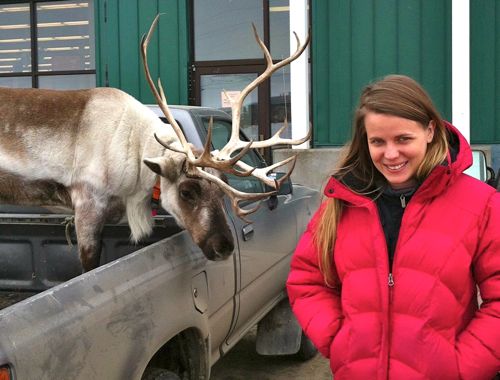Sarah DeLappe is melding the experiences of her sister at KNOM in Nome, with interviews at KCAW in Sitka, to write a play about a public radio station in Alaska.
DeLappe is one of seven Sitka Fellows — a residency program based at the Sitka Fine Arts Camp. Sitka Fellows are under 30, and all have launched promising careers as “intellectual entrepreneurs.”
Listen to iFriendly audio.
Actor: Winter. A radio station at the End of the World. Squint through the seventeen words for snow and you’ll see them—a hodgepodge of wide-eyed volunteers, Alaskan natives, and grizzly homesteaders sounding their voices across the tundra and the frozen sea.
This is not Sarah DeLappe. This is an actor reading an excerpt from Sarah DeLappe’ application to the Sitka Fellows program where she describes how her play might begin.
There’s a bit more of Nome than Sitka in that opening, but DeLappe will be here through the end of the month, long enough for the rainforest to exert some pull.
DeLappe is young, but her credentials are solid. She’s been the artistic director of Yale’s experimental theater company, and she studied under Pulitzer-prize winner Paula Vogel.
DeLappe is drawn to language. Not just the patterns and cadences of speech, but what we say — and don’t say.
“One of the most interesting exercises is to record a conversation and then write it out verbatim. And it’s incredible how many things we don’t say — or assume we say — and just go unspoken. We have very fragmented conversations, which I find fascinating.”
DeLappe reads a lot of plays. It’s her job as the Literary Resident at Playwrights Horizons, an off-broadway theater in New York. She had a play produced her senior year in college, but she says writing is just the first step. You have to send your play around to theaters, to festivals, and hope someone picks it up and reads it. With luck, you’ll get to the next step.
“So a theater will invite you in and set you up with a director and a cast, and then they’ll read your play sitting around a table, and maybe invite other people to come see it. And hopefully — eventually — somebody decides to produce it. But it’s a long, long road to the stage.”
DeLappe’s first produced play was dark — a drama about three sisters who reunite to witness their father’s execution. She intended it to be a dark comedy, but she says, “the comedy never really came out.”
DeLappe became interested in the theater in the usual way — in grade school. She remembers being in the Little Mermaid. She continued acting through school, but then a switch went on, and she felt compelled to create rather than to perform.
Now she’s steeped by the craft of playwriting — down to the smallest detail of producing a play.
“I think as an actor, I’ve felt that egotism of the actor. It’s all about me, I can change this line if I want to, I can improve and ad lib a little bit. Now I find that atrocious, a sin, you can’t do that. The same goes for stage directions. Some directors will go through and cross out all of the stage directions before directing a play and I find that’s anathema — you just can’t do that. It’s the heart and backbone of a play to me.”
Sitka Fellows spend seven weeks in the community, living on the Sheldon Jackson Campus, rubbing elbows with peers who may share some interests in common, but who really are there because they also are young, and are also engaged in creating something.
DeLappe’s idea for her play took root long before she came to Sitka.
“My twin sister, Eva, has for the last year been working at a radio station in Nome, KNOM. And through talking to her, visiting her, spending a little time with her, and just thinking about the radio, I decided to write a play about an Alaskan radio station.”
Radio is auditory; plays are visual. DeLappe doesn’t consider it a stretch to develop a play about people who sit around talking. She considers it just the opposite.
“That’s rich. There’s always a lot going on there. It’s always exciting to pull back the curtain and see the other side, see what people who are always scripted, or who go between scripted and live mediums do when they’re not on a microphone. I think there’s a lot of overlap between radio and theater in that way, between what is on the page, and what actually happens when you’re live.”
DeLappe has met with staff at KCAW for their insight into the world of Alaska public radio. And like her play about the three sisters, she’s tilting toward comedy.
Let’s hope she gets there.
“There will be no executions. At least I don’t think so!”
Actor: Theirs is a story of pilgrims, rabid wildlife, manifest destiny, and above all, words. Today words stretch across vastness. But in that valiant struggle to connect, to actually make contact, lies the human urge for intimacy.
DeLappe hopes to recruit local actors for a reading her work-in-progress at the conclusion of the fellowship this month.
KCAW’s Holly Keen contributed to this story.
































